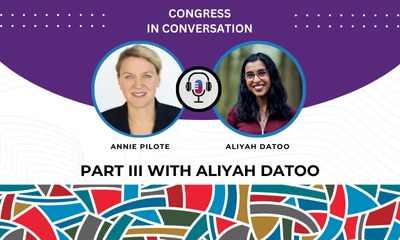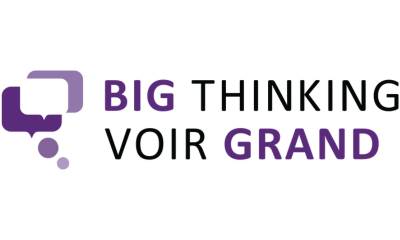REGINA, May 28, 2018 - Political scientist Antonia Maioni will deliver a lecture on the progress (or not) that Canada is making in gender and politics as part of the Congress of the Humanities and Social Sciences. Canada’s largest academic gathering, Congress brings over 5,000 of the country’s brightest researchers, thinkers, and policy-makers to the University of Regina this week.
Unique to Congress 2018 is the first all-female line-up of speakers for the Big Thinking lecture series. Attendees will hear from inspiring thinkers, including TRC Commissioner Marie Wilson on diversity and reconciliation, Antonia Maioni on gender in Canadian politics, Alaa Murabit on leadership and sustainable peace building and Françoise Baylis on the ethics of genetic technologies. The Big Thinking schedule is available at: https://www.congress2018.ca/program/big-thinking. Big Thinking is free and open to the public.
Additional programming runs the gamut of issues in Canadian politics:
Breaking Up the Party: Quebec Nationalism and the Submerging of Nativist Politics in Canada: Canada has been celebrated in popular and academic work for its relative immunity to nativist populism. No competitive nativist party has emerged in federal politics that challenges the mainstream consensus around mass immigration, unlike virtually every other postindustrial democracy. This paper argues that existing explanations for this “exceptionalism” fail to appreciate the importance of Quebec nationalism in contributing to this outcome. Quebec nationalism fractured the relatively strong anti‐immigration sentiment found in rural and small urban areas in Quebec and Anglophone Canada, and prevented right‐wing parties from mobilizing that sentiment in a way that could feasibly win elections. May 31, Classroom CL 232 at 8:45 am.
CrISIS: A Study of Propaganda Games as Digital Recruitment Tools: This research focuses on interactive artifacts used by the terror group ISIS for the purpose of propaganda. It examines why (and how) video games are powerful platforms for both ideological‐extremist propagation and terrorist recruitment in the real world. In addition to exploring the “why”, it also investigates the “how” or the cognitive mechanisms of “priming” and “deindividuation” which are exploited in players of games like ARMA III and Grand Theft Auto 5. May 31, Classroom CL 130 at 1:30 pm.
The Politics of Solidarity: Assessing the Foundations of Québec’s Student Movement: Compared to other provinces, Quebec's post‐secondary students are unusually politically mobilized. Yet the student movement is also clearly divided along linguistic and ideological lines, as well as based on student's fee‐paying status. This research is among the first to measure the relationship between these potential cultural, material, and ideological obstacles to organization and individual students’ commitments to collective student interest. May 31, Classroom CL 316 at 2:00 pm.
Path Dependence and Policy Replication: The Case of Canadian Cannabis Policy: In legalizing cannabis, governments across Canada are undertaking one of the most intense exercises in national policymaking in the country’s history. Under tight timelines provincial policymakers are turning inward - rather than seeking alignment with other governments or innovation within their own borders, they have engaged in internal policy replication. As a result, they have excluded Indigenous people and racialized communities from meaningful involvement in a policymaking process that will have its greatest impact on them. May 31, Classroom CL 316 at 3:45 pm.
Congress is an annual gathering of more than 65 scholarly associations, each holding their annual conference under one umbrella. This year’s theme is “Gathering Diversities”, reflecting the history of Regina as a traditional place of gathering and rich buffalo hunting grounds for Plains cultures.
Events listed here are open to the public. More information about the Federation and Congress 2018 is available online through their website, Twitter and Facebook.
-30-
For interview requests
Federation for the Humanities and Social Sciences
Nicola Katz
Manager of Communications
nkatz@ideas-idees.ca
Cell: 613-282-3489
University of Regina
Dale Johnson
Communications Strategist
dale.johnson@uregina.ca
Cell: 306-531-5995
About the Congress of the Humanities and Social Sciences
Organized by the Federation for the Humanities and Social Sciences, Congress is the largest interdisciplinary conference in Canada, and one of the largest in the world. Now in its 87th year, Congress brings together academic associations that represent a rich spectrum of disciplines in the humanities and social sciences, including literature, history, theatre, film studies, education, music, sociology, geography, social work and many others. Congress 2018 is hosted by the University of Regina. For more information, visit www.congress2018.ca.
About the Federation for the Humanities and Social Sciences
The Federation for the Humanities and Social Sciences promotes research and teaching for the advancement of an inclusive, democratic and prosperous society. With a membership now comprising over 160 universities, colleges and scholarly associations, the Federation represents a diverse community of 91,000 researchers and graduate students across Canada. The Federation organizes Canada’s largest academic gathering, the annual Congress of the Humanities and Social Sciences. For more information about the Federation, visit www.ideas-idees.ca.
About the University of Regina
The University of Regina is constantly pushing the bounds of knowledge and pioneering new ways of thinking about the world. It’s no surprise that the University is ranked in the Top 200 by Times Higher Education in the Best Young Universities category. At the heart of its success is the institution’s commitment to growing diversity. Since 2009, it has increased its international student population by 122 percent and its Indigenous student population by 84 percent. The University of Regina is home to the country’s highest percentage of graduate students from outside Canada, and has received the top ranking in Canada for its number of international research collaborations. For more information about the University of Regina, visit www.uregina.ca.

Bringing communities together
By Dr. Margrit Talpalaru, professor & Academic Convenor for Congress 2025 at George Brown College George Brown College (GBC) is the first college to host the Congress of the Humanities and Social Sciences in its 94 years: this has emerged as the...

Congress in Conversation - Part III with Aliyah Datoo
← Big Thinking Podcast homepage Introduction | About the guest | Aliyah Datoo's Research at Congress | Transcript | Follow us Introduction Welcome to Congress in Conversation, a special series presented by the Big Thinking Podcast in partnership...

Sustaining political community
Big Thinking at Congress 2024 In the face of rising threats to democracy, what can be done to promote sustainable political community? Join us for a thought-provoking discussion on political polarization, social injustice, and the spread of...
